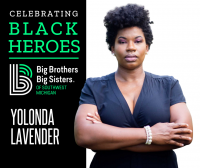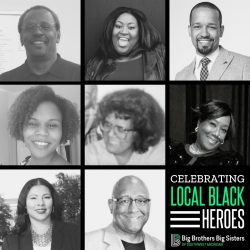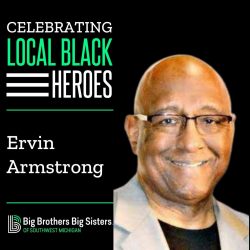Celebrating Local Black Heroes: Arthur Washington Jr. (video)
Big Brothers Big Sisters of Southwest Michigan is proud to celebrate Local Black Heroes in honor of Black History Month. Please join us on social media and our website throughout February to learn more about the impact local heroes have in your community.
A Drum Major for Justice
Arthur Washington, Jr., according to his daughter Tiffany Washington Jackson, was a “drum major for justice.” He dedicated his life to justice for children and families. He was a Civil Rights leader and Kalamazoo’s first Black City Commissioner, serving on the City Commission for over 4 terms starting in 1959.
Washington paved the way for those that came behind him, but also spent time making sure they found the road. His youth programs helped guide and support young people through sports, music and more. A music lover himself, he founded the Bombardiers Drum and Marching Corps and ran it for more than 30 years.*
His granddaughter, Brandi Washington explains, “He… got kids off the streets and gave them something productive to do, like learn how to play a drum or how to dance or play a trumpet…. Things that you wouldn’t necessarily learn in a public school… or have the actual instruments to buy, so he provided those for the children in the community.”
Early Life
Part of the Greatest Generation, Washington served in multiple countries around the Pacific during World War II. Originally from Springfield, Illinois, he was the oldest boy of eleven children. He was also one of the first Black students at the University of Louisville (KY), earning a bachelor’s degree in sociology and a master’s degree in social work, with honors in both. He moved to Kalamazoo in 1955 after he was recruited by phone for a social work job.
“It ignited a flame within him to seek out justice…”
When he and family first arrived in town, the lodging that had been arranged wasn’t available to someone who looked like them. His youngest daughter, Tiffany, recalls, “A white woman didn’t want to sell her home after everything was taken care of, and so he and my mother and sister and brother, as young kids, were turned away.”
Despite the racist welcome, Washington would go on to embrace Kalamazoo, and became a local agent of change. Tiffany says, “It didn’t turn him away and turn him off, it turned him on. It ignited a flame within him to seek out justice…”
That flame led him to become the City’s first Black Commissioner in 1959. The flame also led him to the picket line, when required. He was a vocal activist for equality and equity, picketing both the Van Avery Drug Store and Woolworth’s over racial injustice.
Washington was a member of the Metropolitan Kalamazoo Branch of the NAACP and served as its president from 1957 to 1961. He was on the boards of both the Douglass Community Association and the Northside Association for Community Development, and active in his church.
He spent much of his professional career as a caseworker or in managerial/directorial positions for governmental social services agencies. Tiffany notes, “He was just, as Brandi said, very nurturing, very community-minded, family-minded…. You know, my father raised me to follow the rules. He told us we lived in a glass house, you know, because he was such a public figure.”
On the Streets and In the House
Brandi explains, “He was a pillar in the community. He supported these youth like they were his own, their parents. They could come by and get a soda out his fridge, some candy, whatever they needed. He even did mentorship….
“And it just really makes me happy to know that he left his legacy like that and that people still talk about him and remember him in that way…. If I bump into somebody, ‘Oh, you’re Mr. Washington’s granddaughter? Man, he looked out for me when I was growing up.’ And it just feels really good to hear, just because that’s the type of person he was on the streets and in the house as well.”
Equity, Equality, and Legacy
Both Brandi and Tiffany attribute their commitment to equity and equality to Washington’s influence. Brandi notes that her involvement in this summer’s protests against police brutality and murder in the wake of George Floyd’s death was because of her grandfather.
Tiffany, who works at the Fetzer Institute, says, “My Dad’s philanthropy and non-profit experience really influenced my life…. He was very driven, motivated, and again, community-oriented. And he was about equality. And it has rubbed off on me because I am about equality and I’m about equity. I’m about letting my truth be told and standing in my voice and in my power.”
Tiffany beams, “And so, his legacy is not dead. I mean, his body has passed, but his legacy lives on in all of us- me and my kids, my grandkids – and in the community. It just makes me proud of the legacy that he left.”
*See Murphy Darden’s painting of the Bombardiers Drum and Marching Corps in the Kalamazoo Valley Museum’s current virtual exhibit, Filling in the Gaps: The Art of Murphy Darden.
Find Local Black Heroes throughout the month of February on social media and on our website. Visit ThinkBigToday.org/Volunteer for more information about how you can ignite the power and potential of youth in Southwest Michigan.



